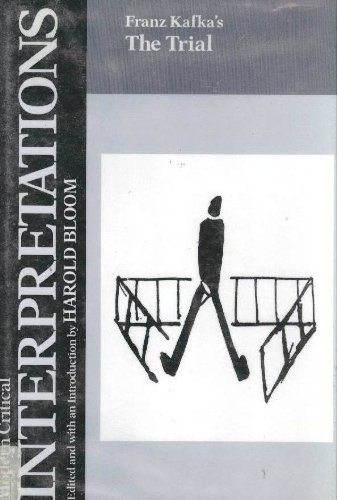Orlion reviewed Franz Kafka's The trial by Harold Bloom (Modern critical interpretations)
Review of "Franz Kafka's The trial" on 'Goodreads'
5 stars
"You must not pay too much to opinions. The text is unalterable, and opinions are often only an expression of bewilderment." Some chaplain in The Trial.
When discussing the concept of the absurd in literature, Albert Camus spent quite a bit of time talking about Franz Kafka. According to Camus, Kafka used the absurd, or the idea that life has no meaning/purpose discernible to humanity, extensively in his work. This has become the standard interpretation of Kafka, it appears, but I believe this interpretation is too broad.
In The Trial, we follow Josef K., mostly referred to as K or Herr K throughout the book, as he is investigated for a crime that he is certain he did not commit...even though he also does not know what he is being accused of. The actual "trial" is in the background, somewhere, being progressed and determined by judges who are never seen based on a law that we only get a snippet of towards the end of the book. What workings we do see of this judicial system are relegated to the errand-boyish activities of the Lower Court.
As K. attempts to get help with his case, we are treated to various characters who promise that they can provide effective assistance even as they state they can not guarantee anything. This duplicity of all the characters (including K.) points to what I think is specifically the subject of the novel: the Dostoevskian absurdity of human nature. The reader is often left scratching their head wondering why the characters continually do things when they could, to their benefit, do something else entirely. The absurdity lies in the fact that there really is no reason why K. does one thing instead of another. In this, we move just beyond Dostoevsky's brand of self-harm where a person pursues detrimental actions to prove that he is an autonomous individual and instead move to a state of mind where a person pursues those actions out of a sense of guilt for some unknown crime and having the impression of being accused by some inaccessible, unknowable Authority (sound familiar?)
Another aspect of the novel that follows from the absurdity is the humor. I found this book to be immensely funny, causing even my dignified self to chuckle out loud in public.
This was a thought-provoking and entertaining read. Way more so considering it was written over a hundred years ago and is actually unfinished. Of course, in this Kafkaesque dream, the incompleteness seems to somehow, and absurdly, make it whole.

